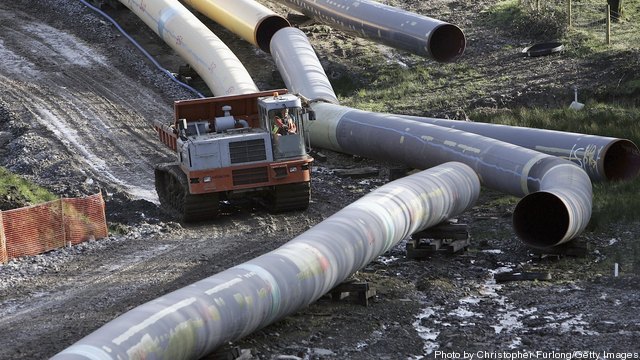Two years ago, Jaroslav Neverovič, then Lithuania’s energy minister, told senators at an Energy and Natural Resources Committee hearing that his country and others in Europe were eager to see the United States ramp up exports of liquefied natural gas (LNG), saying that U.S. LNG would bring needed diversity to Europe’s energy supply.
With legislation to streamline and expedite approvals for U.S. LNG export projects pending in Congress, the U.S. ambassadors of Lithuania, the Czech Republic, Estonia, Hungary, Latvia, Poland and Slovakia wrote to congressional leaders this week, urging action. From their letter to House Speaker Paul Ryan (letters also were sent to Senate Majority Leader Mitch McConnell, Senate Minority Leader Harry Reid and House Minority Leader Nancy Pelosi):
We are pleased that liquefied natural gas (LNG) from the United States is now being exported from Louisiana and that the first U.S. LNG cargoes have already reached Europe. These exports result in greater liquidity to the global natural gas market and have the potential to provide diversity of sources, suppliers and routes thus to a greater energy security in our part of Europe, a region for long dominated by an external state controlled gas supplier, ready to use energy as a political weapon. U.S. LNG exports will also contribute to reducing vulnerability of the CEE (Central and Eastern European) countries.
The ambassadors point out that the regulatory path remains complex in cases where licenses are sought to export LNG to non-Free Trade Agreement countries. They called legislative action to expedite LNG exports to America’s European allies a “timely and significant issue.”
Indeed, it is. The Cold War left these states with a natural gas pipeline system dominated by the Soviet Union and now Russia, which in the past has used energy as a foreign policy weapon. The CEE countries have invested heavily in infrastructure to remedy the situation, building LNG terminals in Lithuania and Poland to allow LNG deliveries from any direction, including the United States.
The key, though, is development of U.S. export infrastructure. The ambassadors’ letter expresses the hope that bipartisan legislation can be completed in the current session of Congress:
We are convinced that the U.S. LNG exports to CEE would be a game changer for the region. It would send a strong geopolitical signal, enhancing competition on the regional market, while at the same time decreasing dependence on the dominant gas supplier and thus increasing the energy security of the CEE.
We’ve posted a number of times detailing the benefits to the United States of exporting domestic natural gas (most recently here and here). These include bringing overseas wealth into this country via trade, economic growth associated with continued energy development and environmental progress as cleaner-burning natural gas comes into wider use and lowers carbon emissions around the world as has occurred in the U.S.
As the world’s No. 1 producer of oil and natural gas, the United States is well-positioned to be a leader in the global LNG market. Our energy renaissance is producing record volumes of natural gas that can amply supply the domestic market and the needs of friends overseas.
Yet, opportunity in the global market isn’t timeless or limitless. Other nations are working to claim market share, and policies are needed to strengthen U.S. competitiveness. While the U.S. has shipped a few cargos of LNG overseas, 30 applications for approval to export are pending before the U.S. Department of Energy, almost half of which were submitted in 2014 or earlier.
There’s bipartisan support in Congress to act to expedite this process, and the time for Congress to act is now. As the CEE ambassadors’ letter to congressional leaders makes clear, much is at stake.
By Mark Green
Originally posted November 16, 2016
Energy Tomorrow is brought to you by the American Petroleum Institute (API), which is the only national trade association that represents all aspects of America’s oil and natural gas industry. Our more than 500 corporate members, from the largest major oil company to the smallest of independents, come from all segments of the industry. They are producers, refiners, suppliers, pipeline operators and marine transporters, as well as service and supply companies that support all segments of the industry.

